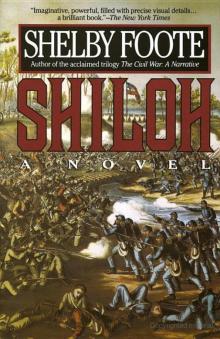- Home
- Shelby Foote
The Civil War: A Narrative: Volume 2: Fredericksburg to Meridian Page 26
The Civil War: A Narrative: Volume 2: Fredericksburg to Meridian Read online
Page 26
No mist, muddle, or fog could hide Bragg from the ire aroused when the public learned the premature and insubstantial basis for his wire announcing that God had granted him and them a Happy New Year. What saved him from the immediate consequences of their anger was his adversary Rosecrans, who, despite his recent promise to “press [the rebels] to the wall,” not only refused to follow up the victory he claimed, but resisted with all his strength—as he had done through the months preceding the march out of Nashville, pleading the need to lay in “a couple of millions of rations”—the efforts by his superiors to prod him into motion. Crittenden, who had commanded the unassailed left wing throughout the first day’s fight and then repulsed his fellow-Kentuckian Breckinridge on the second, stated the case as it appeared to many in the Union ranks: “The battle was fought for the possession of Middle Tennessee. We went down to drive the Confederates out of Murfreesboro, and we drove them out. They went off a few miles and camped again. And we, although we were the victors, virtually went into hospital for six months before we could march after them again.” He added, by way of developing a theory: “As in most of our battles, very meager fruits resulted to either side from such partial victories as were for the most part won. Yet it was a triumph. It showed that in the long run the big purse and the big battalions—both on our side—must win; and it proved that there were no better soldiers than ours.”
Rosecrans disagreed with much of this critique, particularly the remark that the army had gone “into hospital,” but he not only subscribed to Crittenden’s opinion about the big purse and the big battalions, he also took it a step further by insisting that the last ounce be wrung from the advantage. What good were riches, he seemed to be asking, unless they were at hand? When he swung the purse he wanted it to be heavy. “I believe the most fatal errors of this war have begun in an impatient desire of success, that would not take time to get ready,” he protested in mid-February, by way of reply to Halleck’s continuous urging. So the general-in-chief changed his tack. “There is a vacant major generalcy in the Regular Army,” he wired on March 1, “and I am authorized to say that it will be given to the general in the field who first wins an important and decisive victory.” The implication was that Rosecrans had better get to Chattanooga before Grant got to Vicksburg; but Old Rosy did not react at all in the way that had been intended. “As an officer and a citizen, I feel degraded to see such auctioneering of honor,” he replied. “Have we a general who would fight for his own personal benefit, when he would not for honor and the country? He would come by his commission basely in that case, and deserve to be despised by men of honor.” Halleck in turn resented this show of righteous indignation, and said so, which only served to increase their differences. Rosecrans was convinced by now that all of Washington was against him: especially Stanton, who had promised, in the first flush of excitement over the news of a hard-fought triumph, to withhold “nothing … within my power to grant,” but who lately had bridled at filling the balky commander’s many requisitions and requests, including one that his latest promotion be predated so as to give him rank over Grant and all the other western generals. Finally he protested to the President himself, who gave him little satisfaction beyond assurances of admiration. “I know not a single enemy of yours here,” Lincoln wrote, and added: “Truth to speak, I do not appreciate this matter of rank on paper as you officers do. The world will not forget that you fought the battle of Stones River, and it will never care a fig whether you rank Gen. Grant on paper, or he so ranks you.”
By then it was mid-March. The bloody contest, ten weeks back, had done much to increase Old Rosy’s appreciation of the dangers involved in challenging the rebs on their own ground. The rest of March went by, and all of April. Still he would not budge. May followed. Still he would not move until he was good and ready, down to the final nail in the final horseshoe. As June came on, approaching the end of the six-month term which Crittenden said the army spent “in hospital,” Rosecrans made a virtue of his immobility, claiming that by refraining from driving Bragg southward he was preventing him from co-operating with Pemberton against Grant. Besides, he added, he had held a council of war at which it had been decided to “observe a great military maxim, not to risk two great and decisive battles at the same time.” He thought it best to wait till Vicksburg fell or Grant abandoned the effort to take it, whereupon he himself would advance against Bragg and Chattanooga. Halleck by now was fairly frantic. A master of maxims, he fired one back at Rosecrans: “Councils of war never fight.” But this had no more effect than the earlier proddings had done; Old Rosy stayed exactly where he was. If Bragg would only leave him alone, he would gladly return the favor, at any rate until he was good and ready to advance. Just when that would be he would not say.
He might have taken some measure of consolation, amid the proddings, from the fact that his opponent’s troubles quite overmatched his own. The difference was that Rosecrans’ woes came mainly from above, whereas Bragg’s came mainly from below. As a result, the latter were not only more widely spread, they were also frequently sharper barbed. His harsh discipline in camp, unbalanced by conspicuous victories in the field, and his reputation as a commander who invariably retreated after battle, whether his troops won or lost, had resulted in bitter censure from all sides, civil as well as military, in and out of the newspapers. Riding one day near his Tullahoma headquarters, soon after his withdrawal behind Duck River, he encountered a man wearing butternut garb and requested information about the roads. When this had been given, the general thanked him and, unable to tell from his clothes whether the man was a soldier or a civilian—the kindest thing that could be said about dress in the Army of Tennessee was that it was informal—asked if he belonged to Bragg’s army. “Bragg’s army?” the countryman replied, scowling at the grim-faced man on horseback. “Bragg’s got no army. He shot half of them himself, up in Kentucky, and the other half got killed at Murfreesboro.”
Bragg laughed and rode on, curbing for once his terrible temper. But the experience rankled under pressure of newspaper criticisms leveled at him while his troops were getting settled along their new defensive line: particularly the charge, widely printed and reprinted, that he had pulled out of Murfreesboro against the advice of his lieutenants. This was patently untrue, as he could prove by the note from Cheatham and Withers, urging immediate retreat, which he had rejected, at least at first, despite Polk’s indorsement of their plea. Accordingly, he decided to make an issue of it, addressing on January 11 a letter to his chief subordinates. “It becomes necessary for me to save my fair name,” he wrote, and “stop the deluge of abuse which [threatens to] destroy my usefulness and demoralize this army.” He asked them to acquit him of the fabrication that he had gone against their wishes in ordering a retreat, which in point of fact “was resisted by me for some time after [it was] advised by my corps and division commanders.… Unanimous as you were in council in verbally advising a retrograde movement,” he added, “I cannot doubt that you will cheerfully attest the same in writing.” So far, he was on safe ground. Unwilling to let it go at that, however, he closed with something of a flourish: “I desire that you will consult your subordinate commanders and be candid with me.… I shall retire without a regret if I find I have lost the good opinion of my generals, upon whom I have ever relied as upon a foundation of rock.”
This last was what opened the floodgates. Though none could fail to exonerate him from the specific charge that he had originated the notion of retreat, his closing statement that he would retire if he found that he had lost their good opinion presented the generals with a once-in-a-lifetime opportunity, which they did not neglect. Hardee, after pointing out that neither he nor his division commanders had proposed a withdrawal, though they had made no objection once the decision had been announced, replied that he had consulted his subordinates, as requested, and found them “unanimous in the opinion that a change in the command of this army is necessary. In this opinion I concur.” He had “the h
ighest regard for the purity of your motives, your energy, and your personal character,” he told Bragg, but he was “convinced, as you must feel, that the peril of the country is superior to all personal considerations.” His lieutenants replied in a similar vein. “I have consulted with my brigade commanders,” Cleburne wrote, “and they unite with me in personal regard for yourself … but at the same time they see, with regret, and it has also met my observation, that you do not possess the confidence of the army in other respects in that degree necessary to secure success.” Breckinridge was as forthright, and what was more—the officers and men of his division having found Bragg’s report of the recent battle so disparaging to themselves and their dead comrades that they had urged their chief to challenge him to a duel—took perhaps the greatest satisfaction of all in seizing the present chance to sit in judgment. “Acting with the candor which you invoke,” the former Vice President replied, “[my brigade commanders] request me to say that, in their opinion, the conduct of the military operations in front of Murfreesboro made it necessary for our army to retire.” Lest the irony of this be lost, he passed at once to a summation. “They also request me to say that while they entertain the highest respect for your patriotism, it is their opinion that you do not possess the confidence of the army to an extent which will enable you to be useful as its commander. In this opinion I feel bound to state that I concur.”
Polk was away on leave at the time, visiting his refugee family in North Carolina, and in his absence Cheatham and Withers merely replied with an acknowledgment that they had made the original suggestion to withdraw. When the bishop returned at the end of the month he found the army a-buzz with talk of this latest development. Since there was some difference of opinion as to whether Bragg had really intended to call down all this thunder on his head, Polk wrote to ask whether his chief had meant for him to answer both questions—1) as to who was responsible for bringing up the subject of retreat, and 2) as to whether the army commander had lost the confidence of his subordinates—or only the first. Bragg by now had had quite enough “candid” responses to the second question, and stated that he had only wanted to get an opinion on the inception of the retreat; “The paragraph relating to my supercedure was only an expression of the feeling with which I should receive your replies.” In that case, Polk responded, he believed the original battlefield note would suffice as a documentary answer. He was content to let the matter drop. But learning presently that Hardee and his officers felt that he had dodged the issue, thereby leaving them in the position of insubordinate malcontents, he decided to write directly to his friend the President, attaching the rather voluminous correspondence he had had with Bragg. “I feel it my duty to say to you,” he told Davis, “that had I and my division commanders been asked to answer, our replies would have coincided with those of the officers of the other corps.… My opinion is he had better be transferred.” The best place for him, Polk believed, was Richmond, where “his capacity for organization and discipline, which has not been equaled among us, could be used by you at headquarters with infinite advantage to the whole army. I think, too,” he added, “that the best thing to be done in supplying his place would be to give his command to General Joseph E. Johnston. He will cure all discontent and inspire the army with new life and confidence. He is here on the spot, and I am sure will be content to take it.”
Davis was quite aware that Johnston was at Tullahoma, having ordered him there two weeks ago, when Bragg’s circular, together with the replies of Hardee and his lieutenants, first landed on the presidential desk. “Why General Bragg should have selected that tribunal, and have invited its judgment upon him, is to me unexplained; it manifests, however, a condition of things which seems to me to require your presence.” So Davis wrote Johnston, who was engaged at the time in an inspection of the Mobile defenses, instructing him to proceed at once to Bragg’s headquarters and determine “whether he had so far lost the confidence of the army as to impair his usefulness in his present position.… You will, I trust, be able, by conversation with General Bragg and others of his command, to decide what the best interests of the service require, and to give me the advice which I need at this juncture. As that army is part of your command,” the President added, knowing the Virginian’s meticulosity in such matters, “no order will be necessary to give you authority there, as, whether present or absent, you have a right to direct its operations and do whatever else belongs to the general commanding.”
However, Johnston’s squeamishness went further than Davis reckoned. He found much that was improper in the conduct of an inquiry which might result in the displacement of the officer under investigation by the one who was doing the investigating. Besides, he had a high regard for the grim-faced North Carolinian’s abilities. “Bragg has done wonders, I think,” he wrote privately. “No body of troops has done more in proportion to numbers in the same time.” Accordingly on February 3, ten days after his arrival, although “incessant rain has permitted me to see but a fourth of the troops as yet,” he reported them “in high spirits, and as ready as ever for fight.” He found his confidence in Bragg not only unshaken but “confirmed by his recent operations, which, in my opinion, evince great vigor and skill.” In short: “It would be very unfortunate to remove him at this juncture, when he has just earned, if not won, the gratitude of the country.” He would report more fully, Johnston said, when he had completed his inspection. Meanwhile, “I respectfully suggest that, should it appear to you necessary to remove General Bragg, no one in this army or engaged in this investigation ought to be his successor.” Nine days later, his final report buttressed his first impression. He had found the men “well clothed, healthy, and in good spirits,” which gave “positive evidence of General Bragg’s capacity to command.… To me it seems that the operations of this army in Middle Tennessee have been conducted admirably. I can find no record of more effective fighting in modern battles than that of this army in December, evincing great skill in the commander and courage in the troops.” He had heard, he said in closing, that Polk and Hardee had advised their present chief’s removal and his own appointment to the command; but “I am sure that you will agree with me that the part I have borne in this investigation would render it inconsistent with my personal honor to occupy that position.… General Bragg should not be removed.”
With that, he left for Chattanooga. Davis replied that he was “truly gratified at the language of commendation which you employ in relation to General Bragg,” but he considered it “scarcely possible,” in the light of Polk’s and Hardee’s formal disapproval, “for [Bragg] to possess the requisite confidence of the troops.” He still thought Johnston should take over, and he could not see that this involved any breach of military etiquette. Johnston was already in command, by rank and title, whenever he was on the scene; “The removal of General Bragg would only affect you so far as it deprived you of his services.” However, Davis assured him, “You shall not be urged by me to any course which would wound your sensibility of views of professional propriety.” In early March, Johnston having made no reply to this, the Secretary of War added his pleas to those of the Commander in Chief. It was his opinion that Bragg should be “recalled altogether,” but if Johnston’s conscience would not permit this, then he suggested that he keep him at hand, “as an organizer and disciplinarian,” in the post of assistant commander. “Let me urge you, my dear general,” Seddon wrote, “to think well, in view of all the great interests to our beloved South … and, if possible, make the sacrifice of your honorable delicacy to the importance of the occasion and the greatness of our cause.” When Johnston still did not reply—he was back in Mobile by now, though Davis and Seddon supposed he was still in Chattanooga—the matter was taken out of his hands by a wire from Richmond, which reached him on March 12: “Order General Bragg to report to the War Department here for conference. Assume yourself direct charge of the army in Middle Tennessee.”
Perhaps Davis and Seddon had decided that what Johnst
on had been wanting all along, and even hinting at, was for them to order him to the post in spite of his objections; that way, the conditions of honor would be met, since he would have done all he could to avoid the outcome. If so, they were wrong. Johnston really did not want the command. The fact was, he did not want the larger one he had already—his duties, he said disparagingly, were those of an “inspector general”—despite the President’s and the Secretary’s insistence that it was the most important post in the Confederacy. If that was the case, Lee should have it as a reward for his recent accomplishments; then “with great propriety,” Johnston wrote in confidence to a friend, he himself could return to his native Virginia and resume command of the army he had lost at Seven Pines, “where the Yankee bullets found me.” Now it looked as if that hope was going up in smoke. He was ordered to Middle Tennessee, with no alternative to compliance except submission of his resignation.
So it seemed. When he returned to Tullahoma on March 19, however, he found a way—still on grounds of sparing offense to what Seddon had called his “honorable delicacy”—at least to delay what he had sought all this time to avoid. Bragg’s wife was down with typhoid, despaired of by the doctors, and her husband had given over his official duties in order to be at her bedside round the clock. It was therefore no more than normal courtesy, under the circumstances, for Johnston to carry out that portion of the orders which required him to take command of the army; but as for increasing the distracted general’s present woes by instructing him to report at once to Richmond, that was manifestly impossible, Johnston wired the authorities, “on account of Mrs Bragg’s critical condition.” Besides, he added, the country was “becoming practicable” now that the rains had slacked and the roads were drying; “Should the enemy advance, General Bragg will be indispensable here.” Apparently he intended to take the Secretary’s earlier suggestion that he keep the unpopular general at hand as his assistant. But presently even this went by the board. By the time Mrs Bragg had recovered sufficiently from her illness to permit her husband’s return to active duty, Johnston himself was bedridden, suffering from a debility brought on by a flare-up of his wounds. “General Bragg is therefore necessary here,” he notified Richmond on April 10. “If conference with him is still desirable, might not a confidential officer visit him, for the purpose, in Tullahoma?”

 Chickamauga and Other Civil War Stories
Chickamauga and Other Civil War Stories The Civil War: A Narrative: Volume 3: Red River to Appomattox
The Civil War: A Narrative: Volume 3: Red River to Appomattox The Civil War: A Narrative: Volume 1: Fort Sumter to Perryville
The Civil War: A Narrative: Volume 1: Fort Sumter to Perryville Jordan County
Jordan County Shiloh
Shiloh Love in a Dry Season
Love in a Dry Season The Civil War: A Narrative: Volume 2: Fredericksburg to Meridian
The Civil War: A Narrative: Volume 2: Fredericksburg to Meridian Chickamauga
Chickamauga The Civil War: A Narrative: Fredericksburg to Meridian
The Civil War: A Narrative: Fredericksburg to Meridian